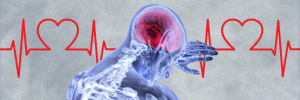
World Stroke Day
A stroke can happen to anyone, at anytime and anywhere. Today stroke is the leading cause of disability worldwide and the second leading cause of death, but almost all strokes could be prevented.
We all know life is tough,
everyone hurrying to do their stuff.
It's easier to light a cigarette and be on the internet,
than to go where your shoes and tar should have met.
Not even talking 'bout the convenience of fast food,
that put your cholesterol, blood pressure and glucose in a “high" mood.
These issues can cause different types of strokes.
Ischemic Stroke:
In 8 out of 10 strokes, a blood vessel that takes blood to your brain gets plugged. It happens when fatty deposits in arteries break off and travel to the brain or when poor blood flow from an irregular heartbeat forms a blood clot.
Hemorrhagic Stroke:
It's less common than an ischemic stroke but can be more serious. A blood vessel in your brain balloons up and bursts, or a weakened one leaks. Uncontrolled high blood pressure and taking too much blood thinner medicine can lead to this kind of stroke.
Some people have what's called a transient ischemic attack (TIA). This "mini stroke" is due to a temporary blockage. It doesn't cause permanent brain damage, but it raises your odds of having a full-scale stroke.
There are 2 types of hemorrhagic strokes:
Intracerebral hemorrhagic (ICH): occurs when a blood vessel bleeds into the tissue, deep within the brain.
Subarachnoid hemorrhagic (SAH): occurs when a blood vessel ruptures on the surface of the brain and bleeds into the space between the brain and skull.
Causes of strokes:
You can treat some conditions that make you more likely to have a stroke. Other things that put you at risk can't be changed:
High blood pressure. Your doctor may call it hypertension. It's the biggest cause of strokes. If your blood pressure is typically 140/90 or higher, your doctor will discuss treatments with you.
Tobacco. Smoking or chewing it raises your odds of a stroke. Nicotine makes your blood pressure go up. Cigarette smoke causes a fatty build up in your main neck artery. It also thickens your blood and makes it more likely to clot. Even second-hand smoke can affect you.
Heart disease. This condition includes defective heart valves as well as atrial fibrillation, or irregular heartbeat, which causes a quarter of all strokes among the very elderly. You can also have clogged arteries from fatty deposits.
Diabetes. People who have it often have high blood pressure and are more likely to be overweight. Both raise the chance of a stroke. Diabetes damages your blood vessels, which makes a stroke more likely. If you have a stroke when your blood sugar levels are high, the injury to your brain is greater.
Weight and exercise. Your chances of a stroke may go up if you're overweight. You can lower your odds by working out every day. Take a brisk 30-minute walk or do muscle-strengthening exercises like pushups and working with weights.
Medications. Some medicines can raise your chances of stroke. For instance, blood-thinning drugs, which doctors suggest to prevent blood clots, can sometimes make a stroke more likely through bleeding. Studies have linked hormone therapy, used for menopause symptoms like hot flashes, with a higher risk of strokes. And low-dose estrogen in birth control pills may also make your odds go up.
Age. Anyone could have a stroke, even babies in the womb. Generally, your chances go up as you get older. They double every decade after age 55.
Family. Strokes can run in families. You and your relatives may share a tendency to get high blood pressure or diabetes. Some strokes can be brought on by a genetic disorder that blocks blood flow to the brain.
Gender. Women are slightly less likely to have a stroke than men of the same age. But women have strokes at a later age, which make them less likely to recover and more likely to die as a result.
This is a small part of what can go wrong
So put on your tekkies and be strong
Hit the road and do exercise
You might see results only in size
But it can prevent you from getting a stroke
Don't do it alone, maybe a friend you can poke?
If you are concerned about your health, or would just like to consult a doctor, please contact Campus Health Service here and make a booking. Otherwise, you are able to chat to a Nurse Practitioner on a walk-in basis.
